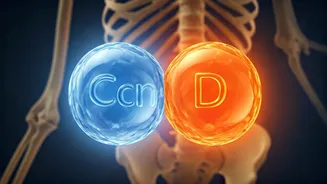The Dynamic Duo
Calcium and vitamin D often come up in conversation about bone health, but their influence stretches far beyond. Calcium, a primary mineral, is fundamental
for strong bones and teeth, playing a key part in muscle function, nerve transmission, and blood clotting. Simultaneously, vitamin D serves as a key player in absorbing calcium. Without adequate vitamin D, the body struggles to effectively use the calcium it gets from food. This vitamin is also essential for immune system health, cell growth, and reducing inflammation. The body produces vitamin D when the skin is exposed to sunlight, and it can also be obtained from certain foods or supplements. When the body has sufficient levels of both calcium and vitamin D, it can perform at its best.
Individual Contributions
Focusing on calcium, this mineral is a building block for bones, making them strong and resistant to fractures. It also facilitates nerve impulses, enabling the brain to communicate effectively with the rest of the body. Furthermore, calcium is critical for the contraction of muscles, enabling movement, and it supports blood clotting, which helps prevent excessive blood loss. Vitamin D, on the other hand, acts as a regulator for calcium absorption. Its role in the body extends to the immune system, helping to fight off infections. It influences cell growth, promoting healthy cells, and reducing inflammation. This vitamin also contributes to mood regulation, influencing overall mental wellness.
Why Together?
The synergy between calcium and vitamin D becomes evident when understanding their impact on bone health. Vitamin D helps the body absorb calcium from the small intestine. Without sufficient vitamin D, the body can only absorb a small percentage of dietary calcium, even if the calcium intake is high. This situation can lead to calcium deficiencies, increasing the risk of osteoporosis, a condition characterized by weak and brittle bones. Furthermore, the combination of calcium and vitamin D supports the functions of muscles and nerves. Vitamin D deficiency can result in muscle weakness and pain, while calcium deficiencies contribute to muscle cramps. Adequate levels of both nutrients ensure optimal nerve function, crucial for proper body function.
Daily Needs Defined
Determining the right amount of calcium and vitamin D to consume each day depends on several factors, including age, sex, and health status. The National Institutes of Health (NIH) provides guidelines, suggesting adults generally need 1,000 to 1,200 milligrams of calcium and 600-800 International Units (IU) of vitamin D daily. These recommendations may vary depending on individual requirements. Pregnant and breastfeeding women, as well as older adults, might require higher levels of both nutrients. Consulting a healthcare professional can help individuals determine their specific needs. They can assess various factors like diet, lifestyle, and any pre-existing health conditions to give tailored recommendations. Regularly reviewing these needs is important to maintain optimal health.
Sources and Consumption
Calcium can be found in a range of foods, including dairy products like milk, yogurt, and cheese. For those who are lactose intolerant or prefer non-dairy options, calcium-fortified plant-based milk alternatives such as almond or soy milk offer a viable alternative. Moreover, green leafy vegetables like kale and broccoli, and fortified foods such as cereals and orange juice, are other good sources. Vitamin D, meanwhile, is naturally present in only a few foods. Fatty fish like salmon and tuna are excellent sources. Many foods are fortified with vitamin D, including milk, some cereals, and orange juice. Additionally, spending time outdoors in sunlight allows the skin to produce vitamin D naturally. However, it is essential to protect the skin from excessive sun exposure to prevent skin damage.
Regular Supplementation
Both calcium and vitamin D can be taken as supplements, but it’s crucial to approach this with caution and guidance from a healthcare provider. Calcium supplements come in various forms, such as calcium carbonate and calcium citrate, each having varying levels of absorption. Vitamin D supplements usually come as D2 (ergocalciferol) and D3 (cholecalciferol), with D3 often considered the more effective form. Supplements can be beneficial for those who do not get enough of these nutrients from their diet or sunlight exposure. However, excessive intake of calcium can lead to side effects like constipation, and very high levels can increase the risk of kidney stones. Overdosing on vitamin D is also possible, which can lead to high blood calcium levels. A healthcare provider can determine the appropriate dosage to suit specific needs.
Deficiency Signs
Calcium deficiency, or hypocalcemia, often presents with subtle symptoms that may initially go unnoticed. Early signs can include muscle cramps, numbness and tingling in the fingers and toes, and fatigue. As the deficiency worsens, it can lead to more severe conditions such as osteoporosis, increasing the risk of fractures. Moreover, calcium deficiency can affect teeth, leading to increased risk of dental problems. Vitamin D deficiency can manifest as fatigue, bone pain, muscle weakness, and mood changes. Prolonged deficiency can lead to rickets in children, characterized by soft and weakened bones, and osteomalacia in adults. Regular health check-ups and monitoring can help prevent deficiencies from progressing to severe health problems.














